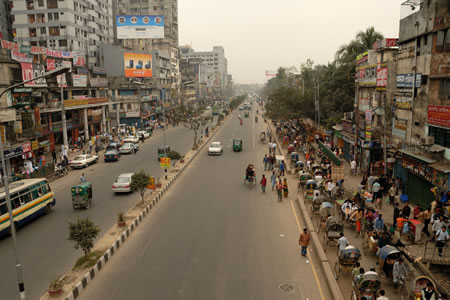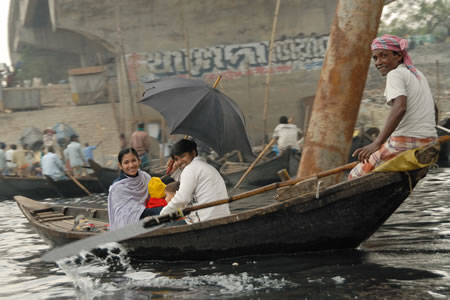

| From Agartala to Dhaka | |
Dhaka (Bangladesh), February 9th 2008 |
|
We are ready for it. We have managed to get a visa for Bangladesh and are looking forward to visit this country. We take an auto-rickshaw in the centre of Agartala at eight o’clock in the morning. Our destination is the border of Bangladesh, only five kilometres away. Bangladesh is still a quite unknown country for us. We haven’t met other travellers so far who went to Bangladesh, and besides that, Bangladesh has no famous tourist attractions. But what do we know? We know that Bangladesh is the most densely populated country in the world, it was hit by the devastating cyclone Sidr last year, it is even poorer than India, and more than 80% of the population is Muslim. The latter is especially interesting. We know from our previous visits to Islamic countries, that in general, the people of these countries are very friendly and hospitable. We really look forward going to Bangladesh. |
|
 |
|
View on Dhaka from a pedestrian bridge |
|
Ten minutes later, we arrive at the border. We first bring a visit to the Indian immigration office, to get the necessary exit stamp. We also inform at the immigration office if there is a place to exchange our last Indian Rupees into Bangladeshi Taka’s. “Here”, is their short answer. With this answer they mean that besides being a border official, they also run an illegal money exchange business. The exchange rate that they offer is ridiculous. They offer 1.5 Taka’s for every Indian Rupee, while the official rate is 1.75. All efforts that we make to get a better rate are wasted energy. At the end, we agree with their rip-off rate, because we do not want to take the Indian Rupees into Bangladesh. After we gave our remaining Rupees to one of the border officials, he jumped on his motorcycle and drove to the centre of Agartala to exchange the Rupees into Taka’s. Probably for the rate of 1.75! Twenty-five minutes later he is back and gives the Taka’s to us. He urges us to keep silent about the transaction, by bringing his forefinger to his lips. The other border official just finished the exit procedure by filling in a lot of forms. The exit procedure formally ends when he puts the stamp in our passport. Finally, we had to bring a short visit to the custom officials before we officially left India. From the Indian side of the border to the Bangladeshi immigration office is a five minute walk. When we arrive over there, the same type of procedure starts to register us officially as visitors of Bangladesh. A couple of big and dusty books are put onto the table and the officials ask us to write down our passport and visa details. Again, the stamp is the official end of the procedure. Afterwards we are “free” to enter Bangladesh. When we leave the immigration office, a couple of bicycle-rickshaw driver gathered at the gate of the office. They all try to convince us to choose him as our driver to the nearby town of Akhaura that has a train connection to the capital city of Dhaka. An older bicycle-rickshaw driver welcomes us with a big smile and asks a hundred Taka’s (€ 1.-) for the five kilometres ride to Akhaura. Despite the fact that the price is a tourist price (way to high), we do not negotiate about the price and choose him as our driver. It is his lucky day. The ride of thirty minutes is beautiful. It takes us through green rice fields. People are working on the fields to plant new rice plants. The road is peacefully quiet. No cars, no busses and no trucks. We only hear the sounds of bicycle bells. We feel sorry for the cows we see. Here in Bangladesh they definitely end up in the pan, while their ‘brothers and sisters’ five kilometres back (in India) are holy and live like a god in France. The rickshaw driver drops us at the railway station of Akhaura where we queue for the train tickets to Dhaka, later that morning. The only tickets available are standing places. We look to each other because of our bad experiences with standing places in an Indian train. The ride is only 2.5 hours, so we decide to take the train. After buying the tickets we try to find a good place on the platform to wait for the train. Within a few minutes, more than thirty local people encircle us. They all stare at us like we are from outer space. We knew that Bangladesh is famous for the ‘staring’ people, but it’s still a strange feeling when it happens. We feel like an animal in the zoo. Every move we make is observed by a big crowd. The crowd slowly moves closer. Some people try to speak some English with us, while others dare to touch us. At a moment that a beggar tries to shove away some people to beg for money, he is chased away competently by “our” crowd. A young and smart orange seller appears on the stage and put his little shop (a basket with oranges) between us and our public. So, now he has more than thirty people watching at his shop. He has to fight for this spot, because other sellers try to copy his smart idea. When the train arrives, a friendly local man helps us to get a good standing place in the train. He takes us to one of the last carriages where we find a spacious spot. But not for long! Young male students join us because they are too eager to talk to us. The first impression we have about Bangladeshi people is very positive. They are very friendly, hospitable, and especially curious. Before the train reached its full speed, a local person already offered his seat to Ivonne. We chat with the other passengers and hear several times that they find it great that we bring a visit to Bangladesh. Once in a while, a hand with a mobile phone appears from the crowd to make a picture of us. It is evidence for the family back home, to show that they travelled in the same carriage as the two foreigners. A student from Brahmanbaria even calls his best friend in Dhaka and gives the phone afterwards to Edwin, to give also his friend the opportunity to chat with Edwin. |
|
 |
|
Crossing the Buriganga River in Dhaka |
|
The journey is relatively comfortable and after two hours we reach the outskirts of Dhaka. This is the first moment that we see how poor Bangladesh is. The green and peaceful country side is substituted by the slums of the big city. People tried to build shelters with the rubbish that they found on the streets. In the train are the middle class Bangladeshi’s that make a short phone call back home with their mobile phones, to say that they almost arrived, or comb their hair to come to light neatly. It is the tough reality of a developing country that made the first steps on the development ladder, but that passes over, like in India, the vast majority of the people. © copyright - Babakoto.eu / 2008 |
|